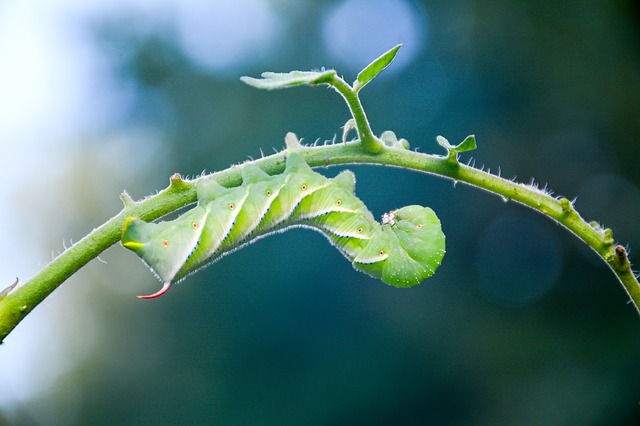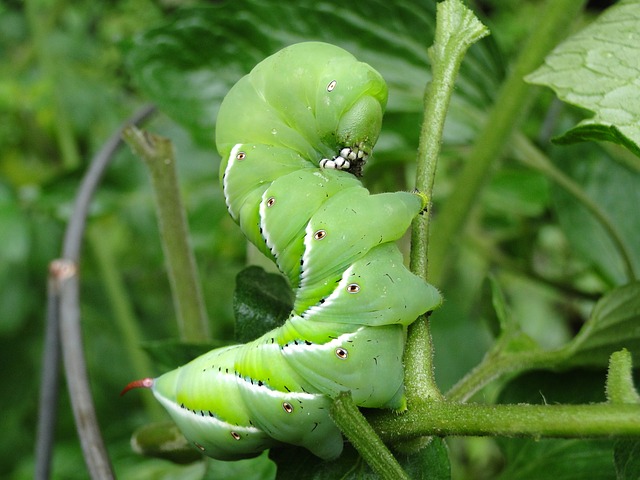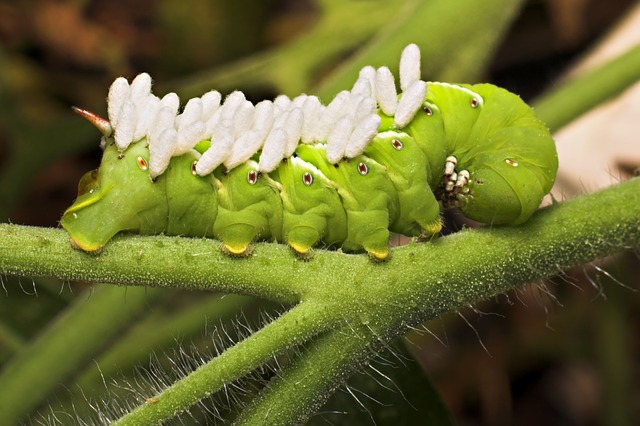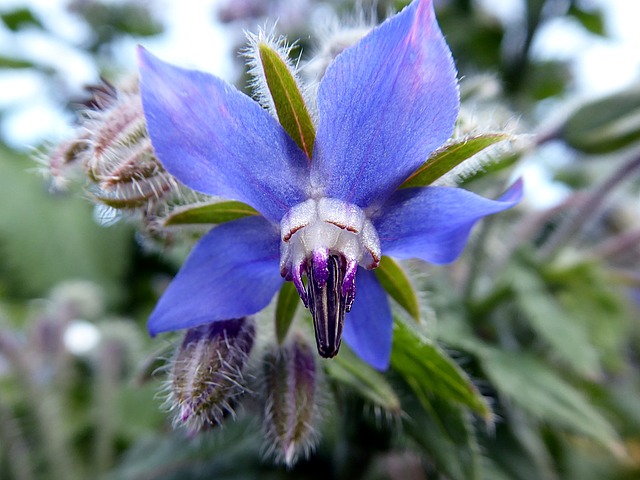If you have never met a hornworm munching on your tomatoes or peppers, then count yourself lucky.
I remember my first time finding a hornworm. I reached into a tomato plant with lush foliage and this green caterpillar, as big as my finger with a horn on its end, stared back at me. I screamed like a little girl rather than the grown woman that I was. The hornworm was killed by my soon-to-be husband. I was very reluctant to pick any more tomatoes for fear that my bare skin might accidentally touch one of these monstrous creatures.
Two Types of Hornworms
There are two kinds of hornworms—tomato hornworms and tobacco hornworms—but both kinds eat the fruit and leaves from tomatoes, peppers, and eggplants.
I usually have the tobacco hornworm variety in my Ohio garden, with its seven V-shaped white marks along its body. The tomato hornworm, on the other hand, has six white stripes. A single hornworm will quickly decimate your crop if it goes unnoticed, so I don’t waste much time analyzing white marks once I find a hornworm.
Signs You’ve Got a Hornworm Problem
Most of the time I spot the signs of a hornworm before I see the actual caterpillar.
There are two things to look for when you visit your tomatoes, peppers, and eggplants:
- First, are there any missing leaves or fruits that have huge sections eaten out of them? Hornworms love to eat leaves.
- Second, are there bits of frass (insect droppings) either on the lower leaves or on the ground? Really fresh frass might be green, but will turn dark brown or black as it gets older. (By the way, I love the word “frass.” I think gardeners could start saying “frass” instead of the other synonymous curse words.)
If there is defoliation and frass, then the hornworm isn’t too far away. I look directly above the frass, but if the hornworm has eaten all the leaves on that branch, then it may have moved to the next branch with lots of food to eat. One summer I found defoliation on one of my hot pepper plants, but couldn’t find the hornworm for a couple of days. It had eaten all the leaves off the first plant and crawled over to a second pepper plant before I located it. But more on that story in a bit. It has a happy ending!
Getting Rid of Hornworms
Unfortunately for bug-phobic people like me, handpicking is the best way to get rid of hornworms when you find them in your garden.
I put on my magic shield (a.k.a. my gardening gloves), put shoes on my feet, and grab a hand trowel or small pruning shears. Hornworms have a surprisingly strong grip on that plant and will not let go of it willingly. If the hornworm is near the end of a branch and I won’t lose any fruit by cutting the branch, then I make the sacrifice. Otherwise I bat at it with my trowel and knock it to the ground. From there I either smash it with my foot or the trowel. (Be careful. Hornworm guts are green and gooey and can shoot out of the animal when smashed. Gross.)
Some people say that chickens like to eat hornworms, but I didn’t have any luck when I tried feeding them to my neighbor’s chickens. They loved Japanese beetle grubs, but that’s another topic for another day. The hens looked at me like I was crazy both times I tried to feed them a hornworm. They always knew I had food when I went to visit and gobbled everything down except for the hornworms.
A Happy Ending
Remember the hornworm that I found on my pepper plant? I didn’t handpick that one off the jalapeno.
Why?
Well, it had these little white things that looked like grains of rice along its body. Those are actually cocoons of a very special parasitoid wasp.
This type of wasp lays her eggs inside the body of the hornworm. The wasp larvae feed on the hornworm and kill it, so I didn’t have to! The wasps are the good guys in this situation. If you see them, leave them alone. Both of my pepper plants bounced back and are producing fruit.
Companion Planting to Discourage Hornworms
As much as I think parasitoid wasps are awesome, I’d rather prevent hornworms from entering my garden in the first place. That’s where companion planting is used.
This year I planted borage near my tomato plants.
My daughter is a budding gardener (and watching over my shoulder as I type), so I let her plant marigolds near my tomatoes. Both of these flowers help keep the hornworms away.
So why did I have any hornworms in my garden this year if I was using good companion plants? I got overly ambitious and put in a new garden bed after I was “done” planting. The first tomato section was the one with the borage and marigolds. The new area had peppers and tomatoes, but no borage or marigolds. I only had one hornworm in the area with companion plants, but many hornworms in the area without.
Next spring, try companion planting for yourself to see how well it works to keep those hornworms away. If a few hornworms still make it into your garden, maybe you’ll be lucky and find parasitoid wasp cocoons growing right out of their big green bodies.
Good luck and happy gardening!
Do you have any tips for discouraging, preventing, or getting rid of tomato hornworms? We’d love to hear them! Let us know your thoughts in the comments section below!
(This article was written by Amy S. as a submission in The Grow Network’s Fall 2015 Writing Contest. It was originally published October 1, 2015.)











COMMENTS(8)
Last year I had lots of hornworms and after researching over the winter I decided to plant basil in between every two tomato plants and also put crushed eggshells around the base of each tomato plant. No hornworms this year.
Well thank you very much for the writeup on those hornworms, that’s very interresting, haha those chickens would have thought, what he’s trying to poison us, they must be prolific eaters, hi to you’re daughter too, love all the stories tc, peter
Good article… You will find those white cocoons near other worms like cabbage worms too. So another reason to leave them alone on horn worms. An alternative to killing them is to put them in a cage and feed it to see the moths they make. But if you have a lot kill them.
This was a bad year for hornworms in my container garden. And yes, I companion planted Marigolds and had a volunteer borage plant. Since these are all planted on my large front porch, here are some discoveries. Easiest way to spot hornworms (other than the tops of your plants being stripped of leaves) is from Frass, thanks Amy, I now know what to call hormworm droppings.
poop.
My experiment with hormworms – first, I collect them with kitchen tongs, then drop them in a large jar. Feed them old tomato leaves from the bottoms of the plants, or the prunings from unwanted new growth, and let them produce more frass…translated that means an additional crop of a different kind of worm castings. Then it all goes into my compost pile or directly in a garden container as an additional compost boost.
Thanks for the great article – did not know about the wasp cocoons.
Yes,absolutely do NOT kill a parasitized hornworm. They are the best thing that can happen to your hornworm population. Yes, it’s hard to NOT kill them immediately, knowing that they won’t die for a few more days, and will keep on eating tomato leaves. But the next year(s) will be worth it. We have 8 gardens, and 240 heirloom tomato plants of 12 different varieties, and this year, we only had ONE hornworm all year!
Frass, gotta train those chickens! Store bought chickens didnt have Mom to show them the delicious morsels also if in a pen most of the time. But it only takes one to show an interest and next thing they are all fighting for it! I train my chicks with bugs I catch with what I want them to hunt down when free ranging.
This was helpful and fun to read. She is good with words and knows how to see the humor in everyday things.
I just realized that I’ve never had a hornworm in my garden. But I guess it’s really not that surprising. I barely grow any tomatoes. They just haven’t found them.